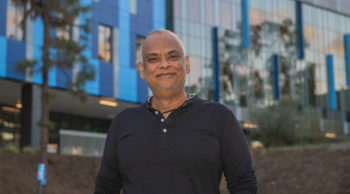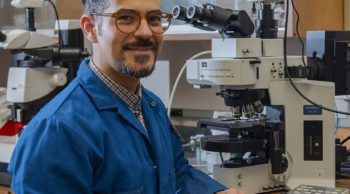Faculty and staff across the California State University are working together to narrow the academic equity gap with help from an innovative professional development program. By: Hazel Kelly It's the little things that count. As simple as it sounds, sometimes just connecting with a student or showing concern can have an impact on their performance in class. For historically underserved and first-generation college students, these connections really count. That's what CSU Dominguez Hills sociology professor Katy Pinto, Ph.D., along with a team from her campus, discovered when they analyzed data for courses in which underrepresented students were performing better than their peers to ... Read More
College of Natural and Behavioral Sciences
Climate Change Fueled the Rise and Demise of the Neo-Assyrian Empire
By: Ashish Sinha, California State University, Dominguez Hills, and Gayatri Kathayat, Xi'an Jiaotong University Ancient Mesopotamia, the fabled land between the Tigris and the Euphrates rivers, was the command and control center of the Neo-Assyrian Empire. This ancient superpower was the largest empire of its time, lasting from 912 BC to 609 BC in what is now modern Iraq and Syria. At its height, the Assyrian state stretched from the Mediterranean and Egypt in the west to the Persian Gulf and western Iran in the east. Then, in an astonishing reversal of fortune, the Neo-Assyrian Empire plummeted from its zenith (circa 650 BC) to complete political collapse within the span of just a few ... Read More
Philip Vieira’s Biosensor Research Could Lead to More Precise Drug Dosage
Philip Vieira, assistant professor of psychology at California State University, Dominguez Hills, has been awarded a $438,000 multi-year grant from the National Institute of Health (NIH) to conduct research into biosensor technology that could lead to more precise prescribed drug dosage and, potentially, reduced addiction. Titled “High Precision Pharmacokinetic Measurements in Brain Using a Novel Aptamer-Based Biosensor,” the grant will enable Vieira to monitor and evaluate how the body interacts with drugs as they cross the blood-brain barrier (BBB), a semipermeable border that separates the circulating blood from the brain and cerebrospinal fluid in the central nervous system. The ... Read More
Professor Ashish Sinha Connects Changes in Climate to Collapse of Great Assyrian Empire
Research led by Ashish Sinha, a professor of earth sciences at California State University, Dominguez Hills (CSUDH), connects major changes in climate with the collapse of the great Assyrian Empire. The findings were published in the November 13 issue of Science Advances, a publication of the American Association for the Advancement of Science. Centered in northern Iraq and extending from western Iran to Egypt, the Neo-Assyrian Empire was the largest empire of its time. It collapsed after more than two centuries of dominance with the fall of its capital, Nineveh (modern Mosul), in 612 BCE. In spite of a plethora of textual documentation in the form of cuneiform writings and archaeological ... Read More
Climate Change may be Behind Fall of Ancient Empire, Say Researchers
The Neo-Assyrian empire was a mighty superpower that dominated the near east for 300 years before its dramatic collapse. Now researchers say they have a novel theory for what was behind its rise and fall: climate change. The empire emerged in about 912BC and grew to stretch from the Mediterranean down to Egypt and out to the Persian Gulf. But shortly after the death of the king Ashurbanipal around 630BC, the empire began to crumble, with the grand city of Nineveh sacked in 612BC. By the end of the seventh century BC, the empire's fall was complete. Now scientists say the reversal in the empire's fortunes appears to coincide with a dramatic shift in its climate from wet to dry - a ... Read More



